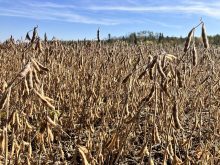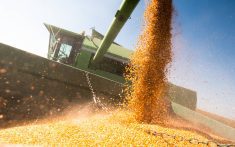Chicago | Reuters — Chicago Board of Trade grain and soybean futures surged on Wednesday after the U.S. Department of Agriculture surprised traders with lower-than-expected plantings estimates and inventory data.
Corn climbed by their daily exchange-imposed limit after USDA pegged plantings of the crop at 92.692 million acres, below analysts’ expectations for 93.787 million. The agency said soybean plantings were 87.555 million acres, compared to analysts’ expectations for 88.955 million.
The U.S. estimates fueled global supply concerns as inventories are slim and growing areas in North and South America are grappling with unfavourable weather.
Read Also

China slashes anti-dumping tariff on Canadian canola in final ruling
China on Saturday sharply reduced its tariff rate on Canadian canola seed in the final ruling of a 17-month anti-dumping investigation, following a thaw in relations between Beijing and Ottawa.
“We needed higher acres to give us a buffer and it went the wrong way,” said Don Roose, president of Iowa-based brokerage U.S. Commodities.
CBOT December corn futures ended up the daily 40-cent limit at $5.88-1/2 a bushel (all figures US$). The limit will temporarily expand to 60 cents on Thursday, according to CBOT owner CME Group.
November soybeans climbed 86-1/2 cents to $13.99 a bushel and hit their highest price in more than two weeks. September wheat closed up 33-1/4 cents at $6.79-1/2 a bushel at the CBOT.
At MGEX, the front-month spring wheat contract reached its highest since February 2013.
The gains were a turnaround from losses in the grain markets before the USDA released its plantings and stocks data.
In its quarterly stocks report, USDA said domestic corn supplies on June 1 stood at 4.122 billion bushels, the lowest for that date since 2014. Soybean stocks came in at a six-year low of 767 million and wheat stocks were 844 million, also the lowest in six years.
Analysts had predicted corn stocks of 4.144 billion, soybean stocks of 787 million and wheat stocks of 859 million.
“There is simply no margin of error for bad weather, and we do have bad weather,” said Arlan Suderman, chief commodities economist for broker StoneX.
— Reporting for Reuters by Tom Polansek in Chicago, Naveen Thukral and Sybille de La Hamaide; additional reporting by Karl Plume and Chris Walljasper in Chicago.















